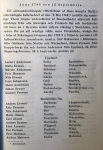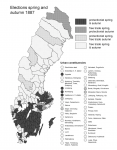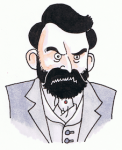Makemakean
Mr Makemean
- Pronouns
- Logical, unlike those in German
Where does it rank in comparison to the Regius Professor of Chronology at St Cedd’s?
The Regius Professorships at Cambridge all date from 1540, according to Wiki.
Where does it rank in comparison to the Regius Professor of Chronology at St Cedd’s?
Given that the one Other Max mentioned involves time travel, though, that may not be the case.The Regius Professorships at Cambridge all date from 1540, according to Wiki.
Which estates are you counting?Looking at the records for the Riksdag of 1760-1761, I find that some parts of the country are ridiculously overrepresented. Närke and Värmland (counted together) have 19 MPs. Malmöhus and Kristianstad each have a mere three.
Which estates are you counting?

So this is from the Peasants at the 1746 Riksdag? I should be able to track that down at UB.

I wouldn't get blinded by that - you'll note that the cities were almost uniformly free-trade (with the odd exception of Östergötland - I could see Norrköping wanting to protect its textile mills from British competition, but the other ones?), and having them tend Cap is going to be Highly Illogical.
I dunno, to me something feels off about that. Småland feels like it has, or should have, this rich Cap tradition. A straight line from Dacke through Pechlin to Sönderheim, you know?It would be, yes. But I have actually been somewhat troubled by there not being enough countryside seats for the Hats, and this allows us to put Småland and Östergötland in their column, or at the very least make those areas Hat/Cap competitive.
I dunno, to me something feels off about that. Småland feels like it has, or should have, this rich Cap tradition. A straight line from Dacke through Pechlin to Sönderheim, you know?
Östergötland I do not mind. Probably not Västergötland either - I always pictured areas dominated by large agricultural estates as more likely to vote Hat, and that covers those provinces (well, not all of Västergötland, but Skaraborg and north-central Älvsborg). It also covers Scania, admittedly, but we can use their pro-free-trade leanings to justify that one sticking with the Caps.
We can still have some Hat strength around Kalmar and Västervik, but I feel like this is a party system where the Darkest Småland conservatives of Kronoberg and the free-church liberals of Jönköping would stand relatively united. Tempered by some Crown strength in the former.That is true. It doesn't really mesh with the technocratic, urban Hats to be strong in darkest Småland. Yeah, you win on that one.
He was also apparently chairman of Heimdal for 1926. I imagine they loved him as the years went by.I would like to add that the data that that image relies upon is apparently thanks to Elis W. Håstad, who wrote quite extensively on the Tariff Elections of 1887. He was also a great fan of the Swiss system of government (him having written his dissertation on the matter), and as an MP for the Right (now the Moderates) he was a maverick calling for a permanent Samlingsregering (a government comprising the Social Democrats, the Agrarian League, the Liberal People's Party, and the Right).
elections by secret ballet

Didn’t the Swedish government carry on as a subnational unit?The above is of course Hugo Hubert Ribbing, Chancery President of Sweden since 1861 (slated to be her last)
Didn’t the Swedish government carry on as a subnational unit?
